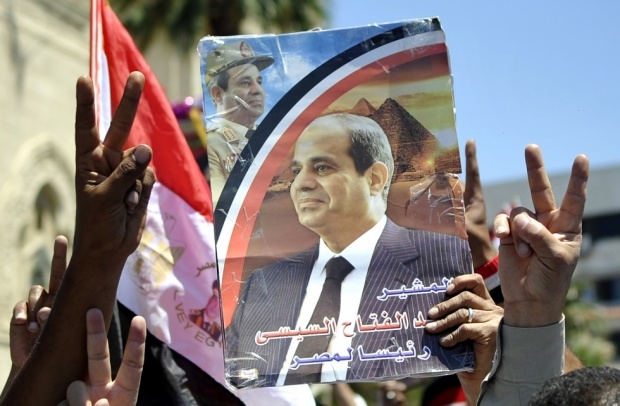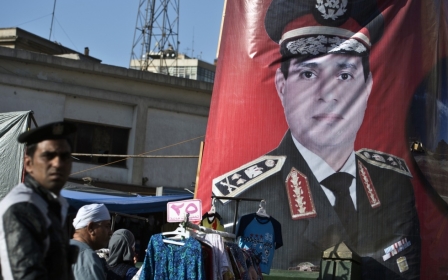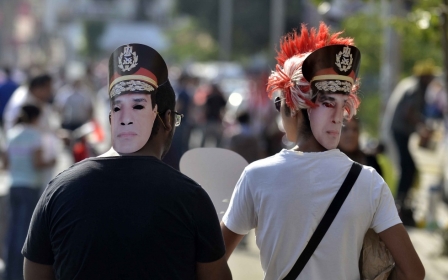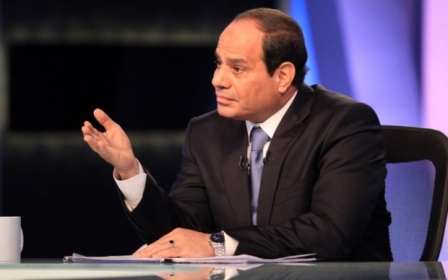Sisi set to win polls but Egypt troubles will continue

Having toppled the elected Islamist president and crushed his supporters, ex-army chief Abdel Fattah al-Sisi is expected to sweep next week's election to cap the bloodiest period in Egypt's modern history.
Millions who support the now retired field marshal believe he is tough enough to stamp out the unrest unleashed by the army removing democratically elected Mohamed Morsi in July.
But true democracy, the ideal millions rallied and fought for in the 2011 uprising that overthrew strongman Hosni Mubarak, might have to wait for a couple of decades, Sisi has said.
Instead, he says he will work hard to restore the economy and law and order, a vague message with enough momentum to coast him to easy victory in the May 26-27 poll.
His only rival is Hamdeen Sabbahi, a leftist politician who says he represents the ideals of the 2011 uprising against Mubarak.
New MEE newsletter: Jerusalem Dispatch
Sign up to get the latest insights and analysis on Israel-Palestine, alongside Turkey Unpacked and other MEE newsletters
With a failing economy, sporadic unrest and militant attacks, many voters in this country of 86 million people will settle for just stability.
At least 1,400 people have been killed since July in street clashes, including hundreds of pro-Morsi protesters on one day in August.
Militants have also killed almost 500 policemen and soldiers.
"The last months have been geared towards this event," said Issandr El Amrani, the North Africa project director for the International Crisis Group, of the election.
After toppling Morsi, Sisi was lionised by the media for months before finally announcing his candidacy in March.
His campaign, such as it is, has been his track record. Sisi has yet to make a public appearance, appearing once by video conference to supporters at a rally.
"He's a fait accompli -- this isn't really an open election," El Amrani said.
Security concerns
His aides say he has real security concerns, after two assassination attempts Sisi has referred to obliquely.
Much of his time is spent at a military-owned hotel where he receives delegations of supporters.
Sisi chose choreographed interviews, all but one to friendly Egyptian media, in which he declined to elaborate on his election programme.
"There are timetables for projects," he said of his economic plans in one television interview.
"Did you ever hear of a five-year plan, or a one-year plan, detailed? We don't want to forget about national security."
Such hazy messaging has already drawn some criticism, even in newspapers that support him.
"Sisi has to realise that at some point, the Wizard of Oz's faithful discovered his truth," wrote one columnist for the privately owned Al-Masry al-Youm newspaper.
Sisi has indicated he would not rush though drastic subsidy cuts to food and fuel, which would be likely to spark further unrest. But he has also indicated he would not tolerate protests.
"What tourist would come to a country where we have demonstrations like this?" he told Egyptian newspaper editors.
"You write in the newspaper, 'No voice is louder than freedom of speech!' What is this?" he asked.
Sisi has also pledged that Morsi's Muslim Brotherhood, blacklisted as a terrorist group after the Islamist's ouster, will not exist during his presidency.
With Morsi and much of the Muslim Brotherhood leadership in prison, along with some 15,000 others detained in the crackdown, there seems little hope of compromise.
Other activists who spearheaded the anti-Mubarak revolt have also been jailed.
"There is no reason to think that the man who is one of those behind one of the greatest periods of repression in recent Egyptian history is interested in democratic reform," El Amrani said.
Sisi has himself indicated he does not believe the country is yet ready, telling the Egyptian editors it could take "20 to 25 years to achieve true democracy".
Meanwhile according to diplomatic sources, Sisi secured a sweeping 94.4 percent of the expatriate vote in a preliminary tally.
Al-Sisi won 289,417 votes abroad, while his rival Sabahi, received only 12,385, according to vote-counts in 133 out of 141 Egyptian embassies and consulates abroad.
The five-day voting period for Egyptian expatriates wrapped up on Monday. The election will be conducted in Egypt on May 26-27.
Middle East Eye delivers independent and unrivalled coverage and analysis of the Middle East, North Africa and beyond. To learn more about republishing this content and the associated fees, please fill out this form. More about MEE can be found here.




